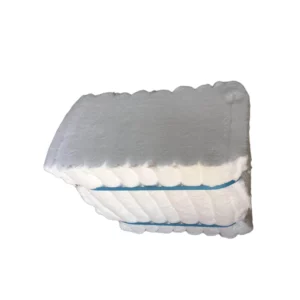Ceramic fiber modules typically do not contribute directly to the insulation of electrical wiring or cables. Instead, they are primarily used for thermal insulation in high-temperature applications such as furnaces, kilns, boilers, and other industrial equipment.
However, there are indirect ways in which ceramic fiber modules can contribute to the insulation of electrical wiring or cables in certain contexts:
- Thermal Barrier: In industrial settings where electrical wiring or cables are installed near high-temperature equipment, ceramic fiber modules can be used to create a thermal barrier between the heat source and the wiring. By insulating the surrounding environment, ceramic fiber modules help to reduce the heat transfer to the electrical components, thereby minimizing the risk of overheating and electrical insulation breakdown.
- Temperature Control: Ceramic fiber modules help to maintain stable temperatures in industrial environments, which can indirectly benefit electrical wiring or cables. By insulating heat-generating equipment, such as furnaces or ovens, ceramic fiber modules help to regulate ambient temperatures and prevent extreme heat buildup in the vicinity of electrical components. This temperature control helps to prolong the lifespan of electrical insulation materials and reduce the risk of thermal degradation or failure.
- Fire Protection: In the event of a fire or thermal event, ceramic fiber modules can provide fire protection for electrical wiring or cables by acting as a barrier against flames and heat. By containing the spread of fire and limiting thermal exposure, ceramic fiber modules ceramic fiber modules help to protect electrical components from direct flame impingement and heat damage, thereby preserving their insulation integrity and preventing electrical malfunctions.
- Insulating Enclosures: In some applications, electrical wiring or cables may be housed within insulated enclosures or compartments to protect them from environmental hazards and temperature extremes. Ceramic fiber modules can be used to line these enclosures, providing additional thermal insulation to maintain stable operating temperatures and protect the electrical components from external heat sources.
- Energy Efficiency: By reducing heat loss and improving thermal efficiency in industrial processes, ceramic fiber modules indirectly contribute to energy savings, which can benefit electrical systems as well. Lower operating temperatures and reduced heat transfer help to optimize energy usage and minimize the demand on electrical infrastructure, leading to improved efficiency and performance of electrical wiring or cables.
Overall, while ceramic fiber modules are not directly involved in the insulation of electrical wiring or cables, they play a crucial role in providing thermal insulation and environmental protection in industrial settings. By creating a stable and controlled operating environment, ceramic fiber modules help to safeguard electrical components from heat-related hazards and ensure reliable performance in demanding applications.
